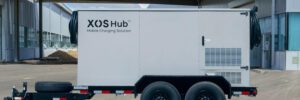
The US DOE has announced a $15.5 billion package of funding and loans primarily focused on retooling existing factories for the transition to EVs. This includes $2 billion in grants and up to $10 billion in loans to support automotive manufacturing conversion projects, along with $3.5 billion in funding to expand domestic manufacturing of batteries, battery materials and components for EVs and the electrical grid.
Overriding objectives of these programs include building domestic supply chains to reduce dependence on overseas suppliers, and retaining and/or expanding high-quality jobs in the automotive industries.
“President Biden is investing in the workforce and factories that made our country a global manufacturing powerhouse,” said Secretary of Energy Jennifer M. Granholm. “Building the cars of the future also necessitates helping the communities challenged by the transition away from the internal combustion engine.”
The Domestic Manufacturing Conversion Grants program will provide $2 billion in cost-shared grants for production of hybrid, plug-in hybrid, battery-electric and hydrogen fuel cell vehicles. This program will support commercial facilities, especially those located in communities with long histories in automotive manufacturing. Preference will also be given to projects that commit to pay high wages for production workers and maintain collective bargaining agreements.
Concept papers are due October 2, 2023, and the deadline for full applications is December 7, 2023.
DOE is also making up to $10 billion in loans available under the Advanced Technology Vehicles Manufacturing Loan Program for automotive manufacturing conversion projects that retain high-quality jobs in communities that currently host manufacturing facilities. DOE will assess the projected economic impacts of the facility conversion relative to the existing facility, including factors such as contribution to the local economy, employment history and anticipated employment.
DOE also plans to invest around $3.5 billion to boost production of advanced batteries and battery materials for EVs and energy storage. This notice of intent—made possible by the President’s Bipartisan Infrastructure Law—represents the second round of funding for the creation of new, retrofitted and expanded domestic facilities for battery materials, battery components and cell manufacturing. The program will support communities with experienced auto workers and a history of producing vehicles.
Source: DOE
from Charged EVs https://ift.tt/6ocuDLS


No comments:
Post a Comment